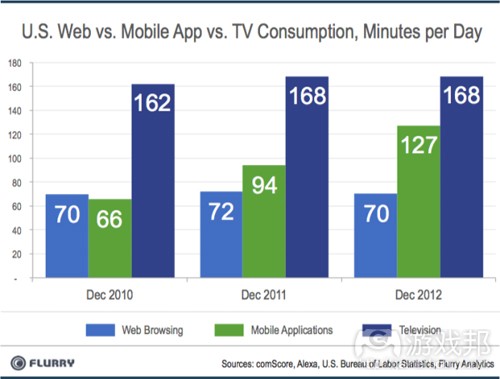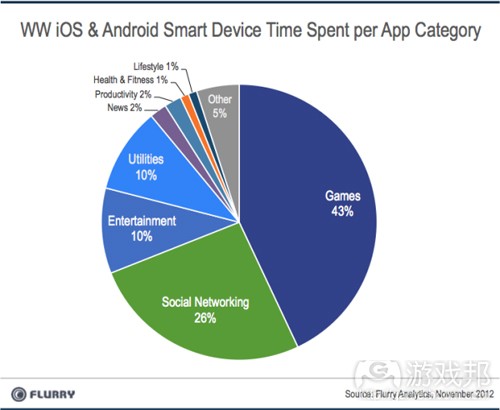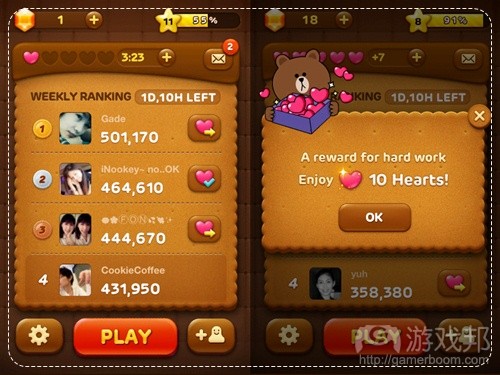每日观察:关注12月份Flurry手机应用调查报告(12.6)
1)Flurry最新报告显示,2012年用户对手机应用使用率增长了35%,而观看电视的时间却依旧如故,网页浏览量则有所下降。
从2011年12月至2012年12月,用户平均每天在手机应用上的投入时间从原来的94分钟增长至127分钟,观看电视的时间仍是168分钟。浏览网页的时间则下降2.4%,从每天的72分钟降至70分钟。
在2012年11月份,iOS和Android用户在游戏、社交网站及娱乐这三种应用中的投入时间占比80%,其中游戏占比43%,用户平均每天游戏时长达55分钟。
2)据serkantoto报道,日本热门聊天应用LINE(已有8000万用户)开发商NHN Japan日前宣布,公司旗下益智游戏《LINE Pop》在iOS和Android平台发布仅12天就实现1000万次下载量。
该游戏发布于11月20日,上线24小时就实现300万次下载量。
该平台另一款热门益智游戏《LINE Birzzle》上线97天即收获1000万次下载量。
LINE平台共推出了6款不同的游戏,计划在年底前将其提升至10款游戏。
3)据gamasutra报道,由前EA Tiburon成员于2011年创立的Row Sham Bow工作室日前向手机平台推出新款竞赛型文字游戏《Letter by Letter》。
该工作室原先开发Facebook游戏,其首席执行官Philip Holt表示,他们从Facebook转向移动领域的一个原因在于,如果是作为用户,他们并不喜欢Faccebook的病毒传播和盈利机制,这些元素会让他们失去玩游戏的兴趣。
不过他也表示自己并不排斥Facebook,并且正在开发Facebook版本的《Letter by Letter》,并与完美世界合作开发针对Facebook和Zynga.com平台的《Knights of the Rose》。
4)据pocketgamer报道,针对舆论认为Unity将针对采用其工具开发的博彩游戏收益征收更高抽成的说法,该公司首席执行官David Helgason日前通过博客澄清并无此事(游戏邦注:pocketgamer上周报道指出Unity 4.X版本的新终端用户授权条款排除了含有赌博机制的游戏,并且有一名开发者声称开发这类游戏的工作室需要向Unity支付“六位数”的授权费用)。
Helgason表示,Unity新授权条款“措辞不当”,导致其内容被开发者所误解,这一新条款并不会对99.9%使用Unity的开发者造成影响,只是要求一小部分正在开发真钱赌博游戏应用的开发者与Unity加强合作,因为赌博是一个监管严格的领域,而获得赌博许可证的过程也非常漫长和艰难。
5)pocketgamer最近发布的信息图表显示,平板电脑市场发展迅速,2012年有38%的澳大利亚人拥有一部平板电脑,美国人的平板电脑用户比例则是22%,英国用户比例为11%。
预计到2013年,平板电脑销量将首次超过笔记本电脑和台式电脑。
平板电脑并非增强的智能手机,有44%用户是在家中使用平板电脑,主要用途是观看视频内容;仅有15%用户是在旅途中使用平板电脑。
有四分之一平板电脑用户使用Twitter。
据Flurry数据显示,用户通过平板电脑玩游戏的时间占比67%,而智能手机游戏使用率的这一比例为39%。
用户通过平板电脑访问应用的平均时间约8分钟,这一数据是智能手机的2倍。
总体来看,用户主要使用平板电脑消费更耗时的内容。
平板电脑用户平均年龄为34岁,智能手机用户则是30岁。
平板电脑女性用户占比49%,智能手机女性用户比例则是44%。
平板电脑用户在游戏中的平均消费额为62美元,而智能手机游戏玩家平均消费额仅为25美元。
除此之外,平板电脑用户对广告的容忍度、点击率与互动程度也普遍高于智能手机用户。
(本文为游戏邦/gamerboom.com编译,拒绝任何不保留版权的转载,如需转载请联系:游戏邦)
1)Flurry: Mobile app usage grows 35%
Scott Reyburn
Mobile app usage grew by 35 percent in 2012 while TV viewing remained the same and web browsing dropped slightly, says mobile app monetization company Flurry.
A new report from San Francisco-based Flurry showed the rise of mobile devices as a competitor against other media formats such as TV and web browsing on laptops and desktops.
From December 2011 to December 2012, the average time spent within mobile apps grew 35 percent from 94 minutes per day to 127 minutes. TV viewing remained that same at 168 minutes per day in both December 2011 and December 2012. Web browsing fell 2.4 percent, which equates to a drop from 72 minutes a day to 70 minutes.
“Mobile apps are gobbling up the web and consumer Internet, and that’s where the opportunity is,” Flurry CEO Simon Khalaf said in the report. “And the opportunity has never been bigger.
All around me, I see entrepreneurs living it, loving it and collecting it ’99 cents’ at a time.”
Flurry also measured time spend using mobile apps by app category on iOS and Android. In November 2012, 80 percent of time was spent in three categories — games, social networking and entertainment. Games lead the pack with 43 percent, which equates to 55 minutes spent per day playing games.(source:insidemobileapps)
2)Puzzle Game LINE Pop Racks Up 10 Million Downloads – In 12 Days
by Dr. Serkan Toto
Japan’s hit chat app LINE (80 million users worldwide and counting) continues to amaze.
Maker NHN Japan announced that puzzle game LINE Pop hit 10 million downloads on iOS and Android – in just 12 days.
The title was released on November 20, along with a few other apps using the LINE Game platform. It needed only 24 hours to reach 3 million downloads.
For reference, the platform’s previous mega hit, another puzzle game called LINE Birzzle, needed 97 days to get to 10 million downloads.
LINE users can currently choose between a total of 6 different games. NHN Japan said that it plans to boost that number to 10 by year-end.(source:serkantoto)
3)Woodland Heroes studio goes where the players go – to their phones
By Kris Graft
Row Sham Bow is a small Orlando-based company whose staff isn’t afraid to go where the audience goes.
The studio is made up of high-ranking EA Tiburon staff who had dedicated a large chunk of their careers to making Madden NFL on an annual basis for the console crowd.
After founding Row Sham Bow in 2011, the company created the game Woodland Heroes (recognized by Gamasutra and its affiliate, the GDC Online Awards, for top-tier design) for the Facebook crowd. And this week, the company has released the clever, uniquely competitive word game Letter by Letter for iOS and Android mobile devices.
It’s becoming an increasingly common story: Facebook developers are redirecting time and resources to mobile game creation.
But for Row Sham Bow CEO Philip Holt, transitioning to mobile wasn’t just a reaction to some perceived market shift.
“One reason [we went from Facebook to mobile] is — I don’t know how to put this delicately — looking at what works in social games, the mechanics that allow for viral growth and retention and monetization are not the kind of mechanics that we enjoy as users,” Holt said in a phone interview.
“The stuff that works on the platform leads to games that we don’t like to play,” he said. “So we’re not the audience. Therefore, it felt a little disingenuous to focus on that platform as our primary launch platform. It felt like a better place to be, because it’s a platform we’re more passionate about, so that was probably one of the most important influences.”
Letter by Letter might at first to be a clone of Words with Friends or Scrabble, but it’s quite a bit more tactical than that. Players do compete head to head against one another, and they do have to make words from random letter tiles. But the goal is to take over the board, and “steal” your opponent’s letters (and points), adding an unique style of competition among word games.
Holt is also fortunate that his platform of preference also resides in a booming — yet highly competitive — marketplace. Going Facebook-first allowed Row Sham Bow to get a handle on the free-to-play business model. (The game makes its money through ads, a paid ad-free version and sales of virtual money.)
He made clear that they’re not anti-Facebook, as a version of Letter by Letter is in development for the social network, and the studio works with Perfect World on the Facebook and Zynga.com game, Knights of the Rose. Facebook was a good learning experience for the studio.
What Facebook didn’t teach Row Sham Bow is exactly how to get people to play your mobile game. It’s a science that the studio, along with everyone else in mobile game development, is trying to figure out.
“Our approach to launching the title was we went through a number of paid acquisition channels,” Holt said. “We wanted to get a seed audience established as quickly as we could so that we could get as high up the charts as possible, because we know that a lot of app discovery happens from people just browsing the charts.”
After that, it’s up to organic growth — word of mouth and viral channels– to really expand the game’s user base. One way to facilitate that was by allowing players to log in to Letter by Letter using their Facebook accounts.
But Row Sham Bow was caught off guard when people were logging into the game via their email addresses instead. So the studio has found the need to adjust its organic growth strategy to one that encourages sharing of the game through email and SMS, and must adjust accordingly.
Ultimately though, Holt admits, the way to facilitate organic growth is to make a game that’s good enough so that players will want to tell their friends about it.
“I think what we’re seeing is a transition to the kinds of games that are going to be successful on Facebook, and going away from the very mass casual stuff, to games that a bit more ‘mid-core,’ ones that don’t appeal quite as much to a broad general audience, but can retain and monetize users better.
“Platforms come and go, and I think the companies that survive understand that platform transitions are a natural part of the game industry,” said Holt, “and you need to go where the audience is going.” (source:gamasutra)
4)Unity: New gambling rules won’t impact 99.9% of developers
by Keith Andrew
Unity CEO David Helgason has taken to the company’s blog to respond to criticism about the firm’s decision to target gambling games with an additional licensing agreement.
As broken on PocketGamer.biz, the new end-user license agreement (EULA) for Unity 4.x specifically singles out games that feature gambling, with one developer claiming studios working on gambling games could have to pay Unity “six figure sums” to license the engine.
Helgason, however, claims that this is not a case of Unity looking to squeeze more cash out of certain developers.
Rather, the company is responding to the changing nature of the industry, better equipping the set up of its engine to deal with the rush of new real money gambling games.
License to thrill
“We learned that gambling companies were using Unity when they started calling us a while ago,” says Helgason in the blog entry.
“We realised that Unity was extremely valuable to them – both because of all the obvious stuff like our tools and features being awesome, but also because we have an obsession with learning about our customers and engaging with them to help them further their goals.
“So we hired a small-but-stellar team and started working with some of the biggest companies in the space.”
Helgason claims this team is designed to protect Unity and its users from the “ensuing complexities” the gambling sector is likely to present.
As such, the change to the EULA requires developers working on gambling games to work with Unity directly to ensure everything is above board.
“The intent was clear enough to us, but it managed to create enough confusion that I realised that the wording wasn’t clear,” he adds.
No gamble
Helgason goes on to clarify gambling activities as “any gambling product or service offered in any market or application that is regulated by any local, state or national authority and requires a gambling license.”
He also claims that the new agreement is “not meant to be about virtual currencies, as it previously could be construed as, and of course will not impact 99.9 percent of the developers using Unity.”
“It will help us engage with those (relatively few but large) companies who are building regulated real money gambling apps with Unity,” clarifies Helgason.
“Gambling is a very heavily regulated industry and the process of acquiring gambling license is generally long, arduous and expensive.
“In the long term this helps us build a sound business servicing these companies, which in turn makes it easier for us to invest heavily in Unity for all our customers and makes it easier to keep our game developer pricing low.”
A matter of trust
Helgason claims this is also a two way street – there will be clear benefits for developers who sign the new gambling game agreement.
“The premium gambling product license and support packages we offer provide professional gambling developers the technology and assistance they need to create a successful and technologically superior product in a very competitive market,” he adds.
“This highly regulated sector requires a high level of support, regardless of the size and experience of the company developing or producing the game.”
It’s important, Helgason concludes, for Unity to remain a “trusted technology provider”, and the new agreement will help nail down that trust and “permit Unity to continue to invest in our product in a manner that contemplates the needs of this sector where we know we can provide a higher level of service and pretty advanced consultation.”
You can expect even further clarification from Helgason in the coming week, when he takes to PocketGamer.biz to answer our questions on the revised EULA.(source:pocketgamer)
5)Infographic: How can developers best take advantage of tablets?
by Mike Cook
The more the tablet market grows, the more it seems that it’s hiding a subtly different kind of user, and a lot of new use-cases to bear in mind.
Porting can sometimes seem like a case of scaling up the art assets and slapping “HD” on the end of the name, but dig a little deeper into how tablets are used – and who uses them – and you’ll find a lot of interesting differences that go beyond screen inches.
Our latest infographic highlights some of the most interesting features of the emerging tablet market, from ad spending to social networks.(source:pocketgamer)













































 闽公网安备35020302001549号
闽公网安备35020302001549号